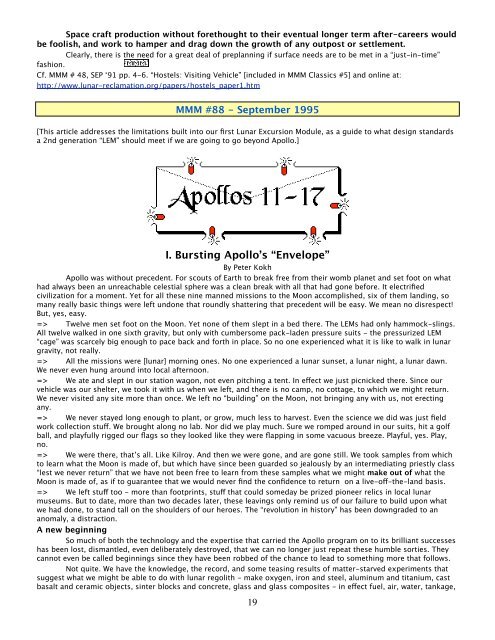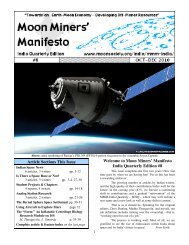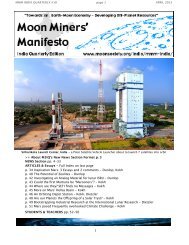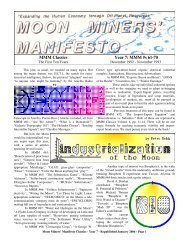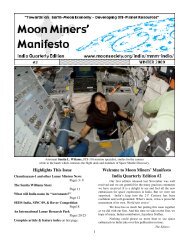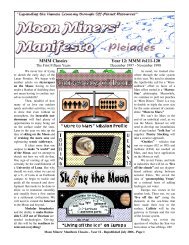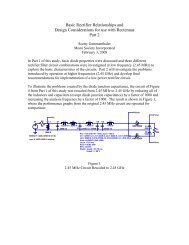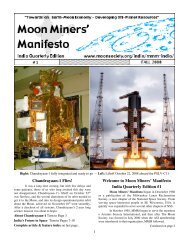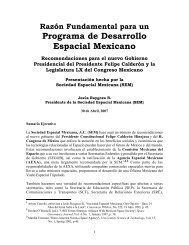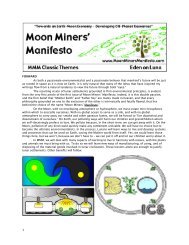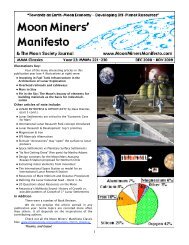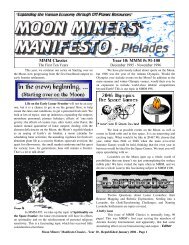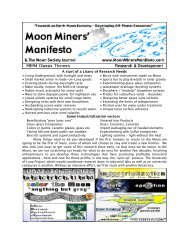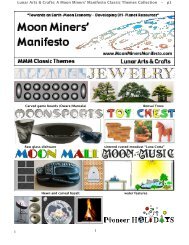Space Transportation - mmmt_transportation.pdf - Moon Society
Space Transportation - mmmt_transportation.pdf - Moon Society
Space Transportation - mmmt_transportation.pdf - Moon Society
Create successful ePaper yourself
Turn your PDF publications into a flip-book with our unique Google optimized e-Paper software.
<strong>Space</strong> craft production without forethought to their eventual longer term after-careers would<br />
be foolish, and work to hamper and drag down the growth of any outpost or settlement.<br />
Clearly, there is the need for a great deal of preplanning if surface needs are to be met in a “just-in-time”<br />
fashion.<br />
Cf. MMM # 48, SEP ‘91 pp. 4-6. “Hostels: Visiting Vehicle” [included in MMM Classics #5] and online at:<br />
http://www.lunar-reclamation.org/papers/hostels_paper1.htm<br />
MMM #88 - September 1995<br />
[This article addresses the limitations built into our first Lunar Excursion Module, as a guide to what design standards<br />
a 2nd generation “LEM” should meet if we are going to go beyond Apollo.]<br />
I. Bursting Apollo’s “Envelope”<br />
By Peter Kokh<br />
Apollo was without precedent. For scouts of Earth to break free from their womb planet and set foot on what<br />
had always been an unreachable celestial sphere was a clean break with all that had gone before. It electrified<br />
civilization for a moment. Yet for all these nine manned missions to the <strong>Moon</strong> accomplished, six of them landing, so<br />
many really basic things were left undone that roundly shattering that precedent will be easy. We mean no disrespect!<br />
But, yes, easy.<br />
=> Twelve men set foot on the <strong>Moon</strong>. Yet none of them slept in a bed there. The LEMs had only hammock-slings.<br />
All twelve walked in one sixth gravity, but only with cumbersome pack-laden pressure suits - the pressurized LEM<br />
“cage” was scarcely big enough to pace back and forth in place. So no one experienced what it is like to walk in lunar<br />
gravity, not really.<br />
=> All the missions were [lunar] morning ones. No one experienced a lunar sunset, a lunar night, a lunar dawn.<br />
We never even hung around into local afternoon.<br />
=> We ate and slept in our station wagon, not even pitching a tent. In effect we just picnicked there. Since our<br />
vehicle was our shelter, we took it with us when we left, and there is no camp, no cottage, to which we might return.<br />
We never visited any site more than once. We left no “building” on the <strong>Moon</strong>, not bringing any with us, not erecting<br />
any.<br />
=> We never stayed long enough to plant, or grow, much less to harvest. Even the science we did was just field<br />
work collection stuff. We brought along no lab. Nor did we play much. Sure we romped around in our suits, hit a golf<br />
ball, and playfully rigged our flags so they looked like they were flapping in some vacuous breeze. Playful, yes. Play,<br />
no.<br />
=> We were there, that’s all. Like Kilroy. And then we were gone, and are gone still. We took samples from which<br />
to learn what the <strong>Moon</strong> is made of, but which have since been guarded so jealously by an intermediating priestly class<br />
“lest we never return” that we have not been free to learn from these samples what we might make out of what the<br />
<strong>Moon</strong> is made of, as if to guarantee that we would never find the confidence to return on a live-off-the-land basis.<br />
=> We left stuff too - more than footprints, stuff that could someday be prized pioneer relics in local lunar<br />
museums. But to date, more than two decades later, these leavings only remind us of our failure to build upon what<br />
we had done, to stand tall on the shoulders of our heroes. The “revolution in history” has been downgraded to an<br />
anomaly, a distraction.<br />
A new beginning<br />
So much of both the technology and the expertise that carried the Apollo program on to its brilliant successes<br />
has been lost, dismantled, even deliberately destroyed, that we can no longer just repeat these humble sorties. They<br />
cannot even be called beginnings since they have been robbed of the chance to lead to something more that follows.<br />
Not quite. We have the knowledge, the record, and some teasing results of matter-starved experiments that<br />
suggest what we might be able to do with lunar regolith - make oxygen, iron and steel, aluminum and titanium, cast<br />
basalt and ceramic objects, sinter blocks and concrete, glass and glass composites - in effect fuel, air, water, tankage,<br />
19


